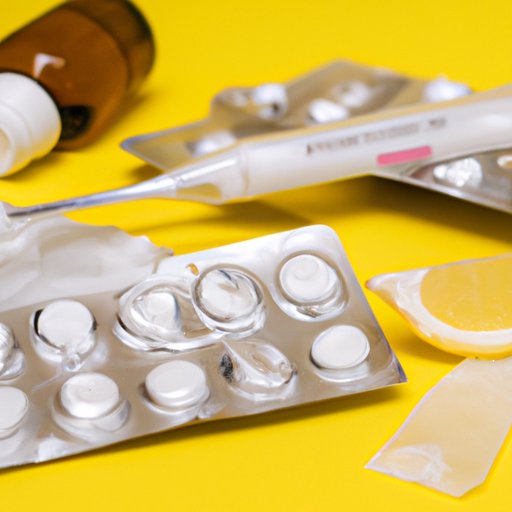
I. Introduction
Sore throats are a common problem that many people encounter at some point in their lives. Whether you’re experiencing pain, irritation, or difficulty swallowing, dealing with a sore throat can be frustrating and uncomfortable.”
Fortunately, there are numerous options available for getting rid of a sore throat, ranging from simple home remedies to more advanced medical treatments. In this article, we’ll explore various methods for treating sore throats and offer practical tips for staying healthy and preventing future occurrences.
II. Home Remedies
One of the simplest and most effective ways to get rid of a sore throat is by using a home remedy. These remedies rely on natural ingredients that can help alleviate pain, reduce inflammation, and boost your body’s immune system.
Honey: Honey is a natural antibacterial agent that can help soothe a sore throat by coating the throat and reducing inflammation. Simply take a spoonful of honey and swallow it slowly, letting it coat your throat as you go.
Saltwater gargling: Gargling with warm saltwater can help reduce inflammation and irritation. Mix 1/4 to 1/2 teaspoon of salt in eight ounces of warm water and gargle for 30 seconds or so, repeating as needed.
Steam inhalation: Inhaling steam can help ease congestion and irritation in the throat. Simply boil a pot of water, place a towel over your head, and inhale the steam for 10-15 minutes.
Hot tea: Drinking hot tea can help soothe a sore throat and reduce inflammation. Chamomile, ginger, and peppermint tea are all good options for this purpose.
III. Over-The-Counter Medicines
If your sore throat is more severe or persistent, you may need to turn to over-the-counter medicines for relief. There are many different types of medicine available for treating sore throats, depending on the underlying cause of the soreness.
Pain relievers: Over-the-counter pain relievers like acetaminophen and ibuprofen can help reduce inflammation and alleviate pain associated with sore throats.
Cough suppressants: Cough suppressants like dextromethorphan can help alleviate coughing associated with sore throats, providing relief and allowing you to recover more quickly.
Throat sprays/lozenges: Throat sprays and lozenges can provide temporary relief from sore throats, reducing pain and irritation.
When choosing an over-the-counter medicine, be sure to read the package instructions carefully and follow them closely. If you have any questions or concerns, don’t hesitate to consult with a healthcare provider.
IV. Hydration
Staying hydrated is crucial when treating a sore throat. When your body is dehydrated, it can further exacerbate the symptoms of a sore throat, leading to more discomfort and longer recovery times.
Drinking plenty of fluids can help keep your body hydrated and flush out any toxins that may be exacerbating your symptoms. Some good fluids for drinking when you have a sore throat include:
– Water
– Tea
– Juice
– Soup
Try to avoid alcohol, coffee, and other beverages that can dehydrate your already-beleaguered system. Additionally, incorporating fluids into your daily routine can help keep you hydrated throughout the day and aid in your recovery.
V. Rest
Rest is vital when dealing with any type of illness, and a sore throat is no exception. When your body is under stress, it can be difficult to fight off infection and recover effectively, leading to prolonged illness and discomfort.
Make sure to take adequate time off work or school to rest and recover, and try to engage in calming activities to reduce stress levels throughout the day. Taking a warm bath, meditating, or practicing deep breathing exercises can all be helpful when dealing with a sore throat.
VI. Prevention
Prevention is always better than cure, and there are numerous preventative measures you can take to help avoid getting a sore throat in the first place.
Some practical tips for staying healthy and reducing your risk of developing a sore throat include:
– Wash your hands regularly.
– Avoid crowded, enclosed spaces when possible.
– Stay away from sick people.
– Maintain a healthy lifestyle overall through regular exercise and a balanced diet.
By taking these steps, you can help keep your immune system strong and reduce your risk of getting sick.
VII. When to Seek Medical Help
While most sore throats can be treated effectively with home remedies and over-the-counter medicines, there are times when you may need to seek medical help.
If your symptoms persist for more than a few days or if you experience additional symptoms such as fever, difficulty breathing, or fatigue, it may be time to see a healthcare provider. Additionally, if you have a sore throat that recurs frequently, it may be a sign of a more serious underlying condition that requires medical attention.
VIII. Conclusion
A sore throat can be an uncomfortable and frustrating problem, but there are many effective ways to treat it and prevent future occurrences. Whether you rely on home remedies, over-the-counter medicines, or a combination of both, taking steps to stay healthy and reduce your risk of infection can help keep you feeling your best.
Remember to rest, stay hydrated, and seek medical help if needed, and you’ll be back on the road to wellness in no time.




